Naka estate: From a quiet suburb to a maze of concrete chaos
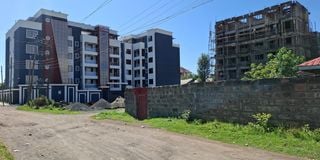
Left, a semi complete high-rise building alongside an upcoming one in Naka Estate on November 6, 2025.
Walking through Naka Estate evokes a range of emotions.
In one area, you are greeted by pin-drop silence, manicured lawns and tall perimeter walls, occasionally punctuated by the sound of children playing behind closed gates.
A few metres further on, however, the calm is shattered by the relentless buzz of construction, with the roar of cement mixers, the chatter of masons and the dull thud of hammers hitting concrete all competing for your attention.
Once a coveted residential address, Naka is slowly losing its serene charm.The taste, order and the middle-class dream of quiet suburban life, now has a patchy appearance with clothes hanging from balconies, walls covered in 'To Let' signs and unfinished buildings standing close together.
In the past, Naka Estate was celebrated as a model of modern urban living, offering the comforts of home while remaining close to the town centre. But years later, that balance is shifting.
What was once a haven for homeowners is turning into a playground for landlords, making it less home-friendly and more commercial.
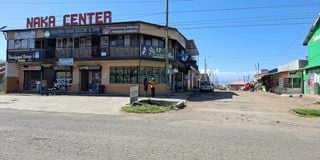
Naka Center on November 6, 2025.
Residential apartments are springing up as developers squeeze apartment blocks into every available space. Consequently, privacy is shrinking, parking is becoming scarce, and the once-quiet neighbourhood is grappling with the ripple effects of unchecked development.
Monicah Wagaki, secretary of the Naka Residents Association, says that Naka was initially planned for single-dwelling homes; however, it now hosts multi-storey apartments that depend on the same ageing systems for water, sewage, drainage and power.
“Some homes no longer get sunlight because of the new high-rises that have been built too close. Rooms have become cold and uncomfortable, and the privacy we once enjoyed is gone. It doesn’t feel like home anymore,” she says.
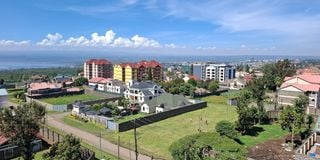
Naka estate on November 6, 2025.
To make matters worse, poor drainage and damaged access roads have added to residents' frustration. During heavy rainfall, water collects on the estate’s narrow roads and flows back into some homes, flooding compounds.
“Back in 2013 or 2014, we even went to court to oppose the construction of multi-storey buildings. However, the case was referred back to the Ministry of Lands, specifically the County Government’s Physical Planning Department, and eventually stalled,” she says.
Uncontrolled construction has also led to public land being seized, including land belonging to Naka Primary and Secondary Schools. The schools were allocated ten acres, but have lost about four to private developers who are now building commercial properties.
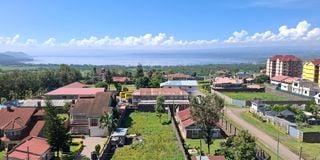
Naka estate on November 6, 2025.
Land grabbing has also extended to land earmarked for churches, shopping centres and public playgrounds, reducing the spaces that once fostered community life.
Monicah notes that, despite lodging several complaints and follow-ups, the relevant authorities have been indifferent to the issues raised.
"We even appealed to the EACC, but the title has never been cancelled and the land remains in private hands. The county knows what’s happening but chooses to look away,” she says.
The association’s chairman, retired Colonel Raymond Cheruiyot, shares his colleagues' sentiments.
“You can’t have hundreds of new apartments and no playgrounds or community spaces. Where do the children go? Where do residents meet?” Colonel Cheruiyot asks.
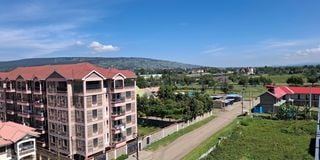
Naka estate on November 6, 2025.
He also raises concerns about the safety of the rapid vertical expansion, questioning whether the area’s soil structure can sustain the weight of the multi-storey buildings being erected.
"The buildings are going up too fast and too high. Due to the county’s soil structure, we are unsure whether the ground beneath can support them, which poses a real danger,” he says.
Overdevelopment has forced residents to endure noise due to the increase in unregulated short-term rentals, such as Airbnbs, which have destroyed the peace that once characterised Naka.
“This used to be a retirement home for many of us. Now it’s noisy, congested and restless, and it's turning into a ghetto,” laments Monicah.
The new homeowners are largely outsiders who buy plots of land and build commercial apartments without engaging with the residents' association.
"We don't even know who they are, and they have shown no interest in joining the association or getting to know their neighbours. This lack of connection has also fuelled insecurity. We used to get to know each other through Nyumba Kumi; now you can’t tell who lives next door. Phones being stolen are becoming common, and the sense of community is gone,” she says.
The final nail in the coffin has been the shift that has triggered the exit of long-term homeowners, many of whom are converting their houses into rentals or selling up and leaving altogether.
"Some of our neighbours have moved back to the village and turned their houses into rentals. I’m planning to leave too. If I find a buyer, I’ll sell up and leave. Life here has become unbearable,” Monicah concludes.


